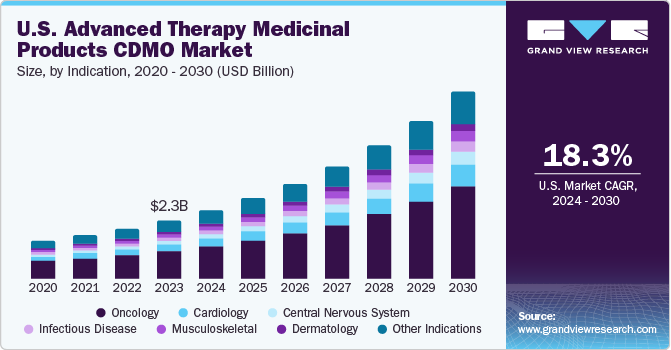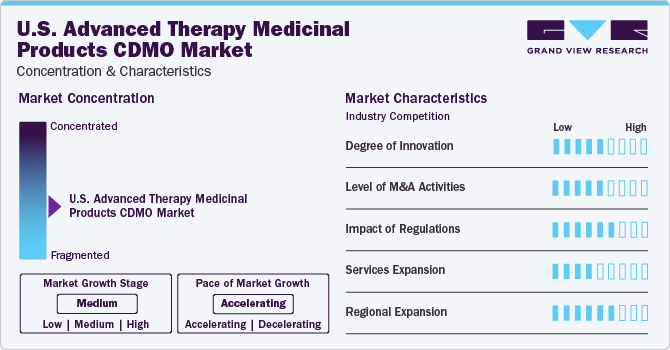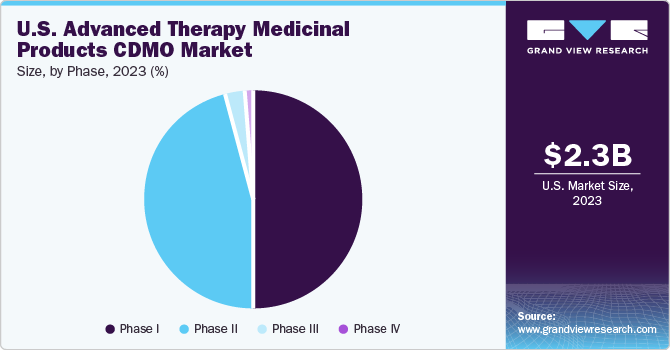- Home
- »
- Medical Devices
- »
-
U.S. Advanced Therapy Medicinal Products CDMO Market, Industry Report, 2030GVR Report cover
![U.S. Advanced Therapy Medicinal Products CDMO Market Size, Share & Trends Report]()
U.S. Advanced Therapy Medicinal Products CDMO Market (2024 - 2030) Size, Share & Trends Analysis Report By Product (Gene Therapy, Cell Therapy), By Phase, By Indication, And Segment Forecasts
- Report ID: GVR-4-68040-287-6
- Number of Report Pages: 125
- Format: PDF
- Historical Range: 2018 - 2023
- Forecast Period: 2024 - 2030
- Industry: Healthcare
- Report Summary
- Table of Contents
- Segmentation
- Methodology
- Download FREE Sample
-
Download Sample Report
Market Size & Trends
The U.S. advanced therapy medicinal products CDMO market size was estimated at USD 2.34 billion in 2023 and is expected to register a CAGR of 18.29% from 2024 to 2030. Key drivers behind this growth include the increasing incidence of rare and severe diseases, significant investments in ATMP R&D, and expanding trend of outsourcing. The complexity of manufacturing ATMPs and growing need for specialized expertise and advanced technologies have fueled the demand for CDMO services, which play a vital role in facilitating the development and commercialization of innovative therapies, thus contributing to market growth.

The U.S. advanced therapy medicinal products CDMO market held the largest share of over 40% of the global advanced therapy medicinal products CDMO market in 2023. Driving factors include a rising number of ATMP clinical trials, growing adoption of advanced therapies, and increasing outsourcing activities. Innovation in technology and manufacturing capabilities by biotech companies create commercial opportunities for market expansion. Recent product approvals have accelerated R&D activities in this field. In addition, a consistent supply of funds and grants has led to the proliferation of ATMP clinical trials. Noncommercial entities, such as universities, sponsor ongoing trials to accelerate their progress.
Outsourcing activities in the ATMP domain are on the rise, as it enables companies to acquire additional competencies for successful development and commercialization of ATMPs. Outsourcing offers extended expertise, better management of cash flows, and significant manufacturing advantages like risk reduction. The low incidence-to-prevalence ratio for genetic and rare diseases makes outsourcing a favorable alternative. In-house facility construction for single gene therapies requires fast cost recovery, and outsourcing serves as an effective strategy until market demand is established. Limited understanding of final scale requirements for current and future products also supports outsourcing preferences.
Public awareness about ATMP treatment options is increasing due to initiatives aimed at informing people about their benefits. This, in turn, is leading to increased adoption of advanced therapies and fueling market growth for CDMOs. For example, OVID Health launched the Cell and Gene Collective in May 2021 with support from companies like Astellas, bluebird bio, Kite, Bristol Myers Squibb, and Novartis, aiming to raise awareness about cell and gene therapies.
Market Concentration & Characteristics
The industry’s innovative drive, marked by continuous investments in research and development, has led to the introduction of cutting-edge technologies and solutions. Notably, advancements in stem cell manufacturing, gene therapies, and tissue-engineered products have significantly enhanced therapy efficiency. The growing applications of ATMPs and cell therapies for diverse disease treatments further boosts industry growth. Stem cell technology’s progress provides a solid foundation for cell therapy development, accelerating industry growth. This commitment to innovation propels the industry forward, fostering advanced therapies and adaptive manufacturing processes that cater to evolving industry and patient needs.

The industry experiences a notable level of mergers and acquisitions, reflecting a dynamic environment where companies seek strategic partnerships to enhance their capabilities and industry presence. Recent examples include collaborations like Polyplus, a prominent U.S. advanced therapy medicinal products (ATMP) CDMO, and its acquisition of Bio Elpida, a French biotechnology CDMO company, indicating a trend towards strategic alliances to drive growth and innovation.
A favorable regulatory environment, promoting and nurturing regenerative medicine development, is anticipated to enhance industry growth. Government backing, including funding and relaxed regulatory constraints, offers researchers valuable opportunities to advance stem cell therapies.
Increasing investments from both public and private organizations, aimed at promoting research on ATMPs, significantly contribute to industry expansion. The involvement of academic institutions and research centers in the development of cell-based medicines further bolsters industry growth. The availability of funds and support from private pcompanies also plays a crucial role in fostering advancements in the sector. For instance, in October 2021, Catalent, Inc. announced the expansion of its manufacturing facility for increasing the production capacities of viral vectors.
Companies are expanding geographically to tap into diverse regional industries, leverage local resources, and establish strategic footholds across the country. For instance, companies like ElevateBio have created production facilities to support the commercialization of cell and gene therapies, showcasing a trend of expanding operations to various states to capitalize on regional opportunities and enhance industry presence.
Product Insights
Gene therapy led the market in 2023 with 49.09% of the total revenue share, driven by increased financial support, clinical trials, and expected commercialization of these products. Early-stage companies facing challenges in generating in-house capabilities are expected to fuel the demand for CDMO services, contributing to the segment’s growth. Collaborative efforts for novel gene therapy development and expanding applications are expected to boost manufacturing prospects in this domain.
Cell therapy is expected to grow at the fastest rate from 2024 to 2030 due to constant advancements in cellular therapeutics, incorporating new cell types. This provides ample opportunities for companies to strengthen their market positions. The market attracts new entrants because of unmet demand for cell therapy manufacturing, recent approvals of advanced therapies, and proven effectiveness of these products. For example, in October 2022, Lonza‘s Houston site received FDA approval for two cell and gene therapies, ZYNTEGLO and SKYSONA, both developed by bluebird bio. This marks the third commercial cell and gene therapy product supported by Lonza’s facility, showcasing the effectiveness of its New Product Introduction process.
Phase Insights
In 2023, Phase I clinical trials dominated the market with revenue share of 50%. These trials were primarily focused on establishing the maximum tolerated dose for patients without adverse effects. Approximately 70% of Phase I drug candidates progress to the next phase. The increasing number of preclinical studies and involvement of small and startup biotechnology and biopharmaceutical companies in R&D activities have led to a rise in demand for CDMOs to conduct Phase I clinical trials. Due to the complex and costly nature of new drug development, companies are outsourcing CDMO services to initiate clinical studies. As emerging biotechnology firms require CDMOs to conduct early-phase trials according to their study requirements, this trend is expected to drive market growth.

Phase III trials are anticipated to grow at the highest CAGR over the forecast period. Phase 3 trials involve a large number of patients and represent the most extensive study period, as they focus on comparing the efficiency and safety of a new drug. An average Phase 3 trial typically lasts between 1 to 4 years. The significant involvement of patients in Phase 3 clinical trials leads to a high demand for therapeutic products required for conducting these studies, thereby increasing the segment growth. This growth is driven by the need for comprehensive evaluation and validation of new drugs before they can be approved and marketed.
Indication Insights
Oncology held the largest revenue share of 45% in 2023 and is anticipated to register the fastest growth over the forecast period. The high number of cancer cases has increased the need for advanced treatments, leading to a big demand for manufacturing services in oncology. Competition among key companies and new treatments have made oncology even more important. As of January 2021, about 18,000 to 19,000 patients could benefit from cell and gene therapies like Kymriah (Novartis AG) and Yescarta (Gilead Sciences, Inc.) for cancer treatment.
The cardiology segment is anticipated to grow lucratively from 2024 to 2030, to the rising prevalence of cardiovascular diseases and collaborative research efforts aimed at developing advanced therapies. Cardiovascular diseases (CVDs) stand as the primary cause of mortality in the U.S., with heart disease being the leading contributor. Despite notable progress in prevention, diagnosis, and treatment, CVDs persist as a substantial health concern. The considerable mortality rate underscores the urgent requirement for innovative treatments to alleviate the burden of these diseases.
Key U.S. Advanced Therapy Medicinal Products CDMO Company Insights
The market is consolidated, driven by the increasing outsourcing activities in the pharmaceutical industry. This consolidation trend is propelled by the need for CDMOs to enhance their capabilities, meet evolving customer demands, and maintain a competitive edge. Companies include Celonic; Bio Elpida; CGT Catapult; Rentschler Biopharma SE; AGC Biologics; and Catalent.
Key companies are adopting market strategies such as collaborations, partnerships, and geographical expansion to increase their market share. For instance, in January 2024, Galapagos NV announced a strategic collaboration with Thermo Fisher Scientific for the decentralized manufacturing of Galapagos’ point-of-care CAR-T product candidate in the San Francisco area. Thermo Fisher provided GMP manufacturing, BioServices, and Specialty Logistics for Galapagos’ CAR-T hemato-oncology clinical program, effective January 2024.
Key U.S. Advanced Therapy Medicinal Products CDMO Companies:
- Celonic
- Bio Elpida
- CGT Catapult
- Rentschler Biopharma SE
- AGC Biologics
- Catalent
- Lonza
- WuXi Advanced Therapies
- BlueReg
- Minaris Regenerative Medicine
- Patheon
Recent Developments
-
In February 2024, Thermo Fisher Scientific expanded its biologics manufacturing facility in St. Louis, Missouri, U.S., doubling its capacity to produce complex treatments for various diseases. This expansion made the facility the largest single-use technology CDMO in the country.
-
In February 2023, Lonza, a global manufacturing partner for the pharmaceutical, biotech, and nutrition industries, announced its plans to expand Early Development Services (EDS) into Cambridge, Massachusetts (U.S.), North America.
-
In February 2022, AGC Biologics entered into a supply agreement with Pfizer, Inc. for the supply of plasmid DNA used for development of an Omicron-based vaccine candidate. The first batch of the vaccine was scheduled to be available by the end of March 2022, according to the company.
-
In February 2022, Thermo Fisher Scientific, Inc. announced the launch of new integrated commercial packaging and distribution services aimed to help patients in the U.S. and Europe transition from clinic to commercial launch.
-
In June 2021, Dendreon Pharmaceuticals, a biopharmaceutical manufacturer of cell therapies, shifted into the CDMO business for late-stage cell therapies to address expertise gaps and rising demand for end-to-end manufacturing.
U.S. Advanced Therapy Medicinal Products CDMO Market Report Scope
Report Attribute
Details
Market size value in 2023
USD 2.34 billion
Revenue forecast in 2030
USD 7.54 billion
Growth rate
CAGR of 18.29% from 2024 to 2030
Actual data
2018 - 2023
Forecast period
2024 - 2030
Quantitative units
Revenue in USD million/billion and CAGR from 2024 to 2030
Report coverage
Revenue forecast, company ranking, competitive landscape, growth factors, trends
Segments covered
Product, phase, indication
Country scope
U.S.
Key companies profiled
Celonic; Bio Elpida; CGT Catapult; Rentschler Biopharma SE; AGC Biologics; Catalent; Lonza; WuXi Advanced Therapies; BlueReg; Minaris Regenerative Medicine; Patheon
Customization scope
Free report customization (equivalent up to 8 analysts working days) with purchase. Addition or alteration to country, regional & segment scope.
Pricing and purchase options
Avail customized purchase options to meet your exact research needs. Explore purchase options
U.S. Advanced Therapy Medicinal Products CDMO Market Report Segmentation
This report forecasts revenue growth at the country level and analyzes the latest industry trends in each of the sub-segments from 2018 to 2030. For this study, Grand View Research has segmented the U.S. advanced therapy medicinal products CDMO market report based on product, phase, and indication.
-
Product Outlook (Revenue, USD Million, 2018 - 2030)
-
Gene Therapy
-
Cell Therapy
-
Tissue Engineered
-
Other Products
-
-
Phase Outlook (Revenue, USD Million, 2018 - 2030)
-
Phase I
-
Phase II
-
Phase III
-
Phase IV
-
-
Indication Outlook (Volume, Units; Revenue, USD Million, 2018 - 2030)
-
Oncology
-
Cardiology
-
Central Nervous System
-
Musculoskeletal
-
Infectious Disease
-
Dermatology
-
Endocrine, Metabolic, Genetic
-
Immunology & Inflammation
-
Opthalmology
-
Haematology
-
Gasteroenterology
-
Other Indications
-
Frequently Asked Questions About This Report
b. The U.S. advanced therapy medicinal products CDMO market size was estimated at USD 2.34 billion in 2023 and is expected to reach USD 2.75 billion in 2024.
b. The U.S. advanced therapy medicinal products CDMO market is expected to grow at a compound annual growth rate of 18.29% from 2024 to 2030 to reach USD 7.54 billion by 2030.
b. Gene therapy segment dominated the U.S. advanced therapy medicinal products CDMO market with a share of 49.10% in 2023. This is attributable to rising awareness about gene therapies coupled with the growing adoption of genetic engineering in research and development initiatives.
b. Some key players operating in the U.S. advanced therapy medicinal products CDMO market include Celonic; Bio Elpida; CGT Catapult; Rentschler Biopharma SE; AGC Biologics; Catalent; Lonza; WuXi Advanced Therapies; BlueReg; Minaris Regenerative Medicine; Patheon
b. Key factors that are driving the market growth include the rising demand for advanced therapy, the rising number of clinical trials for ATMPs, and the growing number of treatments in the personalized medicine space.
Share this report with your colleague or friend.
Need a Tailored Report?
Customize this report to your needs — add regions, segments, or data points, with 20% free customization.

ISO 9001:2015 & 27001:2022 Certified
We are GDPR and CCPA compliant! Your transaction & personal information is safe and secure. For more details, please read our privacy policy.
Trusted market insights - try a free sample
See how our reports are structured and why industry leaders rely on Grand View Research. Get a free sample or ask us to tailor this report to your needs.










